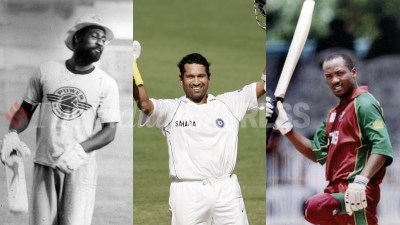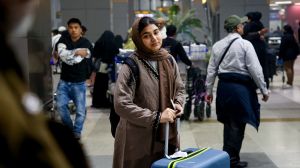OCTOBER SPRING
Let Srinagar bus to Muzaffarabad JYOTI MALHOTRA NEW DELHI, OCTOBER 22: Junking the bitterness of recent history, India offered to resurrec...

Let Srinagar bus to Muzaffarabad
NEW DELHI, OCTOBER 22: Junking the bitterness of recent history, India offered to resurrect its relationship with Pakistan today with a dozen radical proposals that offer the promise of new beginnings and set the stage for a productive meeting with the leadership in Islamabad at the SAARC summit in January.
Hoping that the unpleasant exchanges with the Pakistani leadership in New York last month were already a testimony of things past, External Affairs minister Yashwant Sinha this evening announced breathtaking new proposals that have the potential to wipe some of the tears of Partition.
On top of the list is a bus service across the Line of Control in Kashmir, from Srinagar to Muzaffarabad in Pakistan-Occupied Kashmir as well as the revival of a rail link from Khokrapar to Munabao in Rajasthan on the International Boundary IB.
|
The New Delhi offer
|
||
|
8226; Restoration of sports ties |
Meanwhile, in deference to the pain and memories of a homeland they have been afraid to call their own for 55 years, India8217;s senior citizens have been allowed to cross the Attari-Wagah border on foot. They still have to stand in queue to get their visas, but New Delhi has promised that it will hold visa camps all over the country so as to make the process less painful.
Significantly, the Government has dug deep into the archives to revive a passenger ferry service that once plied from Mumbai to Karachi until the 1965 war which made it sputter to death.
Meanwhile, the fishermen of the sub-continent, who hold no other god in awe as much as they do the Arabian Sea, are now being allowed the grace of a band of water on the high seas, where even if they are apprehended by the other side, they will be returned home .
The Indian Coast Guard is also being ordered to prepare for weekly conversations with its counterpart on the lines of the hotline that the Directors General of Military Operations DGMOs from both sides participate in.
Sinha was at pains to emphasise at a press conference this evening that today8217;s proposals were aimed at a 8216;8216;normalisation process8217;8217; that was in place before the attack on Parliament on December 13, 2001. But this did not mean that India was willing to begin the process of formal dialogue with Pakistan, which would be dependent on the end of cross-border terrorism.
By separating its intention to deepen contact with the people of Pakistan from the leadership of General Musharraf, New Delhi seemed at last to be groping for normalcy. By offering the restoration of sporting links such as hockey, cricket, polo, kabaddi, etc 8212; the BCCI will now have the right to decide what it wants to do with Pakistani cricket 8212; as well as by reiterating a renewed offer to restore air links and overflights, the Government seemed to be junking excessive bureacratic control at the altar of political leadership.
For example, India8217;s offer of a bus service from Srinagar to Muzaffarabad, with possible checkpoints at Uri, is pure high strategy. By offering talks between Deputy Prime Minister L K Advani and the Hurriyat in the morning and telling the people of Kashmir the same evening that they can cross the Line of Control 8212; only if Pakistan allows them to do so 8212; New Delhi has very smartly thrown the ball into Islamabad8217;s court.
Of course, Yashwant Sinha told a journalist in answer to a question, that India would not give up its claims to 8216;8216;Pakistan-Occupied Kashmir.8217;8217; But analysts pointed out that even as passengers on the Srinagar-Muzaffarabad bus got to stamp their travel documents back and forth, the emergence of a 8216;8216;soft border8217;8217; was an inevitable fact. That the Indian proposal was really another means of formalising the Line of Control between the two countries.
|
PM8217;s Peace map
|
||||
|
8226; Lahore, February 1999: 8216;8216;I believe that the distancebetween Delhi and Lahore has shrunk. We can change our friends but not our neighbours, we can change history but not geography8217;8217; 8226; Agra, July 2001: The much-hyped Summit fails, but the then External Affairs minister Jaswant Singh says that the 8216;8216;caravan of peace must go on8217;8217; 8226; Parliament attack, Dec 2001: Major setback, India recalls high commissioner, cancels airlinks, Army massed on the border 8226; Kumarakom, December 2001: Musing, he says he is determined to address Kashmir, 8216;8216;one of the bitter legacies of Partition8217;8217; Story continues below this ad 8226; Kaluchak, May 2002: Attack on Army camp raises spectre of war 8226; Jammu and Kashmir, Sept 2002: State elections are a major success 8226; Srinagar, April 2003: PM extends a 8216;8216;hand of friendship8217;8217; to Pakistan 8226; New Delhi, Oct 2003: Twelve new proposals to Pak |
||||
It is this proposal more than any other that is bound to set the cat among the pigeons in Pakistan. It reinvents the offer made in the week before the Agra summit in July 2001, but goes somewhat beyond by offering a concrete bus service. When Agra failed, the pathbreaking proposal went out of the window, but PM Vajpayee was now resurrecting it two months before he went to Islamabad, the analysts said.
Foreign Secretary Kanwal Sibal called in Pakistan High Commissioner Aziz Khan this afternoon and told him about India8217;s proposals. MEA sources said New Delhi was willing to start its services with immediate effect even without reciprocity.
India8217;s turnaround comes within a month of a bitter squabble with the Pakistani leadership in New York in September, when none other than the Prime Minister was forced to accept at a press conference that his peace initiative of April with Pakistan was pretty much in tatters. 8216;8216;Mujhe afsos hai I am sad about this,8217;8217; the PM had said.
Diplomatic sources also pointed out that New Delhi8217;s determined refusal to talk to Pakistan until cross-border terrorism came to an end was resulting in negative dividends. That the whole world, led by US president George Bush at his meeting with the Prime Minister in New York, had said that even as he told General Musharraf to shut down the terrorist training camps and end cross-border terrorism, India must respond by starting dialogue. 8216;8216;The fact that India was refusing to talk was playing into the hands of the hardline elements in Pakistan,8217;8217; the diplomats said.
Islamabad: It sounds good, but what of the dialogue?
ISLAMABAD, OCTOBER 22: Pakistan today said it was disappointed that India8217;s fresh proposals to normalise ties did not include its offer to resume dialogue but promised to respond positively to any measure 8216;8216;genuinely designed to improve relations.8217;8217;
Foreign Office spokesman Masood Khan said that Pakistani response to 8216;8216;any proposal that is substantive, unconditional and genuinely designed to improve relations will as always be positive8217;8217;.
Khan hoped that India will reconsider its position on the resumption of the composite talks as 8216;8216;some of the proposals made by India are already integral to the composite dialogue process.8217;8217;
Stating that a detailed reaction would follow soon, Khan said: 8216;8216;We will have to carefully examine them. Let us not put the cart before the horse.8217;8217;
He said some of the Indian proposals like increasing staff strength of the high commissions have figured in the proposals made by Pakistan PM Mir Zafarullah Khan Jamali in May this year in response to Prime Minister A B Vajpayee8217;s fresh initiative for peace.
However, the spokesman declined to comment on India8217;s decision to authorise Deputy Prime Minister L K Advani to hold talks with the Hurriyat faction led by Abbas Ansari. 8216;8216;Let us wait for reactions from Srinagar before we react,8217;8217; he said.
- 01
- 02
- 03
- 04
- 05































